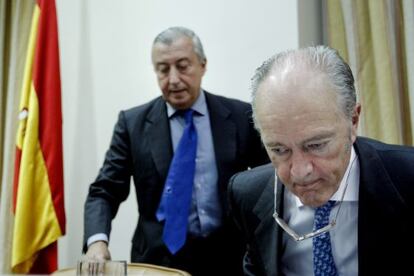Spanish rail operators pledge to boost safety following crash
Adif and Renfe reiterate commitment to reviewing procedures in a parliamentary hearing on Santiago accident that killed 79

The president of Spain’s rail network operator, Adif, has told members of the congressional Public Works Committee that the track where a train derailed at 179 km/hour on July 24, killing 79 people and injuring close to 200 more, was not built as a high-speed line, and that the decision to make the track part of Spain’s high-speed network had knock-on effects on signaling and safety systems. The safety system used on the part of the line where the accident took place (ASFA) is a different one from that used on most high-speed trains.
“[ASFA] informs the driver what he is going to find up ahead,” Gonzalo Ferre explained on Thursday.
The Santiago driver, who has been provisionally charged with 79 counts of negligent homicide, was not warned that he was going too fast because that warning system is only activated at 200km/hour.
“We are reviewing our safety,” Ferre told members of Congress. “Safety in the rail sector is a constant issue and we are not going to forget that.”
The president of Renfe, the state-owned company that runs Spain’s trains, Julio Gómez-Pomar, said that the operator was also taking steps to improve safety. The vehicle had reportedly been fully inspected prior to its journey that day. He also told the hearing that speed signs on the line were clear and highly visible.
According to the train’s black box, all the vehicle’s warning systems were on green prior to the accident. The driver, José Garzón Amo, had apparently received a phone call from a colleague two minutes before the crash. Gómez-Pomar told the hearing that phone calls were only made to drivers in exceptional circumstances and that drivers are forbidden to use their cellphones when at the controls.
Within minutes of the accident, “all the emergency protocols” had been activated, said Gómez-Pomar. The train operator has assigned 2.7 million euros to pay compensation to families.
Adif’s Ferre concluded: “Telling [the victims] that they have our support does not seem sufficient to me. We are all asking ourselves: ‘How could this accident have been avoided?’”







































